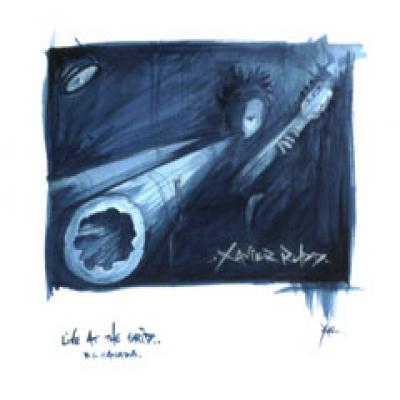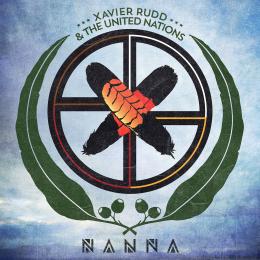Posted by: Anonymous | April 21st, 2005
The Aussie's multi-instrumental style should appeal to fans of Keller Williams, but Rudd manages to wring more soul from his voice and three instruments than Williams does with his chest full of sonic toys. While Williams tends to focus more on repetitive loops and licks, Rudd's warm, earthy sound is just as suited to muddy Mississippi blues as to the bouncing hippie grooves of Williams and other jammier contemporaries that might churn the stomachs of acoustic traditionalists.
The didgeridoo "Introduction" of To Let lights a fire in the desert sand as painted bodies stomp around the sparks dancing above the flames until the aboriginal blues of "Conceal Me" get electrified by drums and bass. Strong rhythmic tides merge with the blues rock of Ben Harper and open the club doors for the natives, who dance right alongside the rockers on "9 Times a Day," "Timber and Wood" and "To Let," which alternates groovy anticipation with explosive energy much like the Dave Matthews Band's older material.
Like Matthew's, Rudd's voice swings from guttural and fierce to sweet and gentle as his songs require. He accompanies himself on the djimbe on "Light the Shade," a cheery island love song, and the lyrical innocence of "Little Chief" and "One Short Story" are reflected in Rudd's lullaby vocals. He sings soft but strong on a cover of Hendrix's "The Wind Cries Mary," which, like several of the songs on To Let, is repeated on Live at the Grid.
While all of Rudd's work radiates a comfortable intimacy, the imperfections of the live album, recorded in front of a very small audience at a friend's studio in British Columbia, feel more like home. The passion captured here can't be shared by just a man, a microphone and a tape recorder, and the distorted buzz that signals the jump from calm indignation to gritty, bare-knuckled brawling on "Conceal Me" is the kind of perfect flaw that wouldn't be allowed in the studio.
"A Fourth World" and "Silence" again explore Rudd's quieter reflective side, but most of the live set is reserved for weighty strumming and fierce slide work. The guitar on "To Let" is at once heavier and more organic, and the instrumentals "Lap Jam" and "Dij/Aztec" let Rudd stretch the limitations of his tools at hand.
While Rudd is a competent player and singer, his songs' primal strength doesn't focus on any particular aspect of the music, but more on the overall energy that the disparate parts produce. The expansive sounds of his acoustic strumming and droning didgeridoo allow Rudd to pour more emotional into his instruments and his voice than he could through overthinking technical virtuosity. To Let furnishes a bit more of that detailed dexterity, but despite its imperfections, Live at the Grid captures Rudd's primal spirit. Both, however, are excellent introductions to an artist with huge possibilities.
by Brian Gearing
The didgeridoo "Introduction" of To Let lights a fire in the desert sand as painted bodies stomp around the sparks dancing above the flames until the aboriginal blues of "Conceal Me" get electrified by drums and bass. Strong rhythmic tides merge with the blues rock of Ben Harper and open the club doors for the natives, who dance right alongside the rockers on "9 Times a Day," "Timber and Wood" and "To Let," which alternates groovy anticipation with explosive energy much like the Dave Matthews Band's older material.
Like Matthew's, Rudd's voice swings from guttural and fierce to sweet and gentle as his songs require. He accompanies himself on the djimbe on "Light the Shade," a cheery island love song, and the lyrical innocence of "Little Chief" and "One Short Story" are reflected in Rudd's lullaby vocals. He sings soft but strong on a cover of Hendrix's "The Wind Cries Mary," which, like several of the songs on To Let, is repeated on Live at the Grid.
While all of Rudd's work radiates a comfortable intimacy, the imperfections of the live album, recorded in front of a very small audience at a friend's studio in British Columbia, feel more like home. The passion captured here can't be shared by just a man, a microphone and a tape recorder, and the distorted buzz that signals the jump from calm indignation to gritty, bare-knuckled brawling on "Conceal Me" is the kind of perfect flaw that wouldn't be allowed in the studio.
"A Fourth World" and "Silence" again explore Rudd's quieter reflective side, but most of the live set is reserved for weighty strumming and fierce slide work. The guitar on "To Let" is at once heavier and more organic, and the instrumentals "Lap Jam" and "Dij/Aztec" let Rudd stretch the limitations of his tools at hand.
While Rudd is a competent player and singer, his songs' primal strength doesn't focus on any particular aspect of the music, but more on the overall energy that the disparate parts produce. The expansive sounds of his acoustic strumming and droning didgeridoo allow Rudd to pour more emotional into his instruments and his voice than he could through overthinking technical virtuosity. To Let furnishes a bit more of that detailed dexterity, but despite its imperfections, Live at the Grid captures Rudd's primal spirit. Both, however, are excellent introductions to an artist with huge possibilities.
by Brian Gearing



